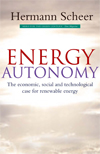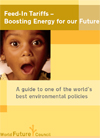Madam Speaker, dear colleagues in the Swedish Parliament, dear friends,
"There is no alternative" - has become the most popular catchword of leaders in policy and economy. That is how they appeal to people to carry out the leaders' decisions and developments, not to criticize them and not to ponder whether other decisions and developments are possible. The more lopsided and short-sighted, the more absurd and dangerous the course of global economy and civilization, the louder the apodictic statement: "There is no alternative". By this statement, the majority of present leaders in the so called "First World" want to taboo reasoning and want to denounce those talking about - and working for - alternatives: as being unrealistic, not to be taken seriously, or simply ridiculous.
"There is no alternative" - that is the power formula and lie of the neo-liberalistic modern age, the tranquilizer for the public so that they will not put into practice their democratic rights, it is the order to cancel thinking and to give up criticism.All that happens in a time screaming for alternatives:
- to the danger of nuclear proliferation, since the nuclear powers ignore their contractual obligation for a complete nuclear disarmament;
- to nuclear and fossil energies, in order to prevent a threatening global conflict on exhaustible resources and the destruction of natural fundaments of life;
- to the global market economy which is actually leading towards global cartels and turning elected governments to puppets on the strings of transnational corporations;
- to making life patentable, allowing private corporations to expropriate common heritage;
- to the globalization of agriculture, rendering the protection of soils, forests, and water resources impossible and undermining the economic living conditions of hundreds of millions of small farmers.
In the beginning of the 90s, globalization was understood as the global responsibility for the global environment and a fair world order. Today, at the end of the 90s, globalization is abused as a ruthless global competition to the disadvantage of the natural environment, of social values, democratic self-determination and deep-rooted cultures.
Global development is on a way which is not sustainable for mankind and nature. But present world leaders make the absurd attempt to solve the problems by accelerating speed. Economic reasoning is reduced to day-to-day comparisons of product costs. This corresponds to a daily "muddling through"-policy along this dead-end-road.
The more obvious these contradictions become, the louder the call for consensus is uttered. Consensus is to send critics to sleep, get them adapted, and suffocate their alternatives. Consensus is to generate conformism. The one who agrees will have a more comfortable individual life-style, whilst living conditions for an increasing number of people are becoming more and more uncomfortable, ending in intolerable poverty.
Nowadays, alternatives are more urgent than ever before. Therefore the Awards we have received today are more necessary and relevant than ever.
Many people paid and are paying with their very lives for their commitment. I feel a little ashamed in view of their courage to take such risks. Nobody can tell whether he or she will be able to face such dangers and still continue in his or her efforts. No prize can honour their unique courage. I thank you very much for the prize I got. It is a prize for my organization EUROSOLAR too – and for all who are fighting against the cosa nostra of the nuclear/fossil energy.
I had the chance, under comparatively favourable conditions, to describe a decisive goal for the overall future and to help urge it into practice:
- to identify the global destruction of the environment primarily as being a consequence of the use of fossil and nuclear energies and the global inequality as being a consequence of global dependencies on exhaustible resources and its transnational corporations.
- to motivate people to leave the path of a destructive nuclear/fossil energy supply with conventional energies and turn to environmentally sound self-sufficiency with renewable energies.
Thus we must give new thought to how people might live peacefully together in the one world instead of being played off against each other. That is only possible by a regeneration of regional economies, so that people get a chance for an independent development, right were they live. A precondition for that is to use regional renewable resources supplied by the sun: The visible hand of the sun instead of the invisible hand of the global resource market for energy, food, and raw materials. To recognise and to use the sun in the service of mankind and to give the laws of nature priority over the laws of market economy: This is the general idea I’m working for.
Renewable energies are inexhaustible. They do not destroy the environment. They are available everywhere. They ensure peace. They enable a fairer distribution of wealth. Their use facilitates solidarity with future generations. They secure the future of mankind.
Their use must lead towards the replacement of the nuclear/fossil energy economy. Whether this replacement will be done in time – that is, in the first half of the 21st century – will be the answer to the question whether the industrial revolution was a unique chance for mankind to improve life conditions – or the start of its collective extermination. This replacement cannot be implemented without conflicts and we have to cope with them. We have to fight for renewing the economy with renewable energies – for building a new century.
This perspective is essential for overcoming the psychological disaster of having no alternative.
It follows the general idea of free and equal chances of life, in terms of world society and of present and future generations. Nobody succeeded better in the wording of this request than Immanuel Kant with his categorical imperative: “Act as if the maxim of your action was to become through your will a universal law of nature.'” This phrase places the common well-being above egoism. In the age of weapons of mass destruction, of the pyromania burning nuclear and fossil energies, of genetic piracy, public welfare must be seen in a more comprehensive way, since the egoisms have become more dangerous and far reaching. There are not only individual egoisms but manifold collective ones too – not only the national and racist egoism. There is the resource egoism of industrial countries, the security egoism of nuclear states, there is the egoism of present generations to the disadvantage of the following ones.
Why should people act, if – on the one hand – they know the comprehensive dangers of the global nuclear/fossil pyromania but – on the other hand – they are told again and again that there is no alternative? Those believing both will resign and deprive mankind of its motivation to avert the nuclear/fossil danger.
We should begin with showing the manifold opportunities of Renewable Energies to the people. This is what stimulates them to take initiative. And that is the main meaning in this Alternative Nobel Prize: personally a stimulus for my ongoing work and in general – and more important – for many many people. Solar energy is the energy of the people and of nature. To use it does not require expensive activities of only a few big corporations or governments. It requires billions of initiatives by billions of people. They have the opportunity to switch from being a part of the problem to becoming a part of the global solution. To bring people and nature together, people must use the same energy as nature: the energy of the sun.
Thank you !



